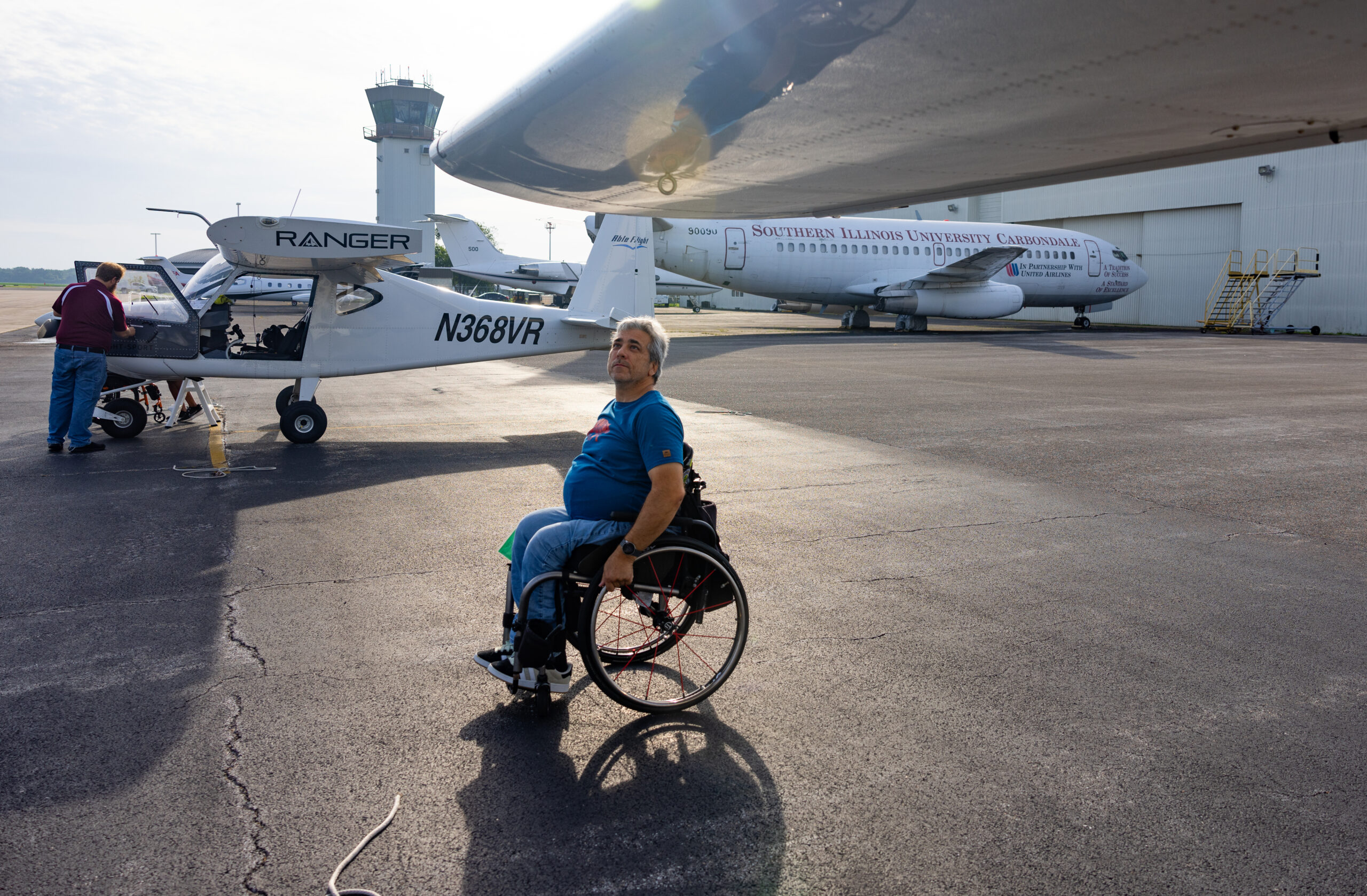The skies above southern Illinois offered a new perspective this summer for Chris Karadjov — associate journalism professor, Bulgarian immigrant and now, licensed pilot.
After years of curiosity and a long-delayed dream, Karadjov arrived at the airport near Marion, Illinois in May to begin intensive flight training through Able Flight, a nonprofit that helps people with disabilities earn their pilot certificates. Each day, after hours of lessons at Southern Illinois University Carbondale’s School of Aviation, he returned to town, exhausted, often accompanied by Ahri, his Shiba Inu.
“Until two months ago, I had no idea how it felt to fly,” said Karadjov, now in his twentieth year at California State University Long Beach. “It’s probably one of the most challenging things I’ve ever done.”
Becoming a pilot wasn’t a childhood fantasy. In fact, Karadjov once feared flying, but after a brief introductory flight, gifted by his wife more than a decade ago, the idea quietly took root. However, shortly after, a skiing accident in 2012 left him with a spinal cord injury. “I was just skiing for fun. And then, I just did not make a turn correctly and hit my back on a tree,” Karadjov said.
Now, over 13 years after that first taste of aviation, Karadjov has completed solo flights and mastered the theory, meteorology and precision required to fly. His July training marked the end of one journey and the beginning of another.
“I got terrible motion sickness. I was afraid that I won’t be able to continue in the program,” he said. “You have at least two flights a day. This is several hours of flying. It’s hot, it’s noisy. It’s a lot of things that you have to get used to. It’s overwhelming.”
Although Karadjov is very open to sharing his experience across social media and with other journalists, he hates being an inspirational story. “Because then you reduce your disability. And you’re not that. Would you treat a person who is black versus white any differently? So why would you treat a person with a disability differently?” Karadjov said. “I don’t argue with people but it’s reducing the person to their disability, which is wrong. Just like it’s wrong to reduce a person to their race, gender, whatever.”
Growing up in a Soviet culture where the lives of people with disabilities were perceived as ended, his perspective changed when visiting a friend in Stanford, California, in 1996, long before he became disabled himself.
“They were giving us a tour of the campus and we went to the college radio station. There was a guy in a wheelchair. I looked at him, I chatted with him. He was a DJ at the station. He was, I don’t remember, a graduate or undergraduate, majoring in computer science. And he had a girlfriend. Wow, so people in wheelchairs can have a life?” Karadjov said.
Able Flight is a national nonprofit program founded in 2006 with the mission to expand the capabilities of people with disabilities. Before this year, 98 people have earned pilot certificates, and 10 Able Flight pilots own or are building their own airplanes.
For every student pilot, the first solo flight is one of the most memorable experiences; Karadjov’s first flight was on June 26. “You make your radio calls to the tower telling them that you’re ready. Then you accelerate. That’s the first time you took off and landed by yourself,” he said. “It keeps you doing things. Not just for anybody with a disability. It is for any person. If you don’t keep yourself sharp, you don’t challenge yourself, it’s very easy to slide.”
He said such flight training is an efficient intervention to improve the access of people with disabilities to more opportunities — and to educate society. “It’s a great way to normalize disability. The more you see disabilities, the more people with disabilities have equal access and equal opportunity to do things,” Karadjov said.
The experience of becoming a licensed pilot gave him more than just the opportunity to learn to fly; the professor became a student again and enjoyed every moment of this adventure. “One of my instructors is 22. That’s the age of my students. The head of the program was asking me how I would feel being taught by somebody half my age, “ Karadjov said. “I’m a professor in my field. I’m nobody in aviation. They’re my teachers. There are rules that you have to follow; otherwise, you die or somebody else dies.”
The next plan is to find an aircraft with adaptive pilot controls and more opportunities to fly across the U.S. “Once you get the license, it’s like renting a car. It’s more expensive, obviously. But you can share the cost with friends. There are ways to do it. With the adaptive controls, there are not many planes. That’s the challenge,” Karadjov said. “But I’m addicted.”
Adriana Bzovii is a Fulbright student from Moldova, pursuing a master’s degree at SIUC’s School of Journalism and Advertising. She was a 2025 summer intern at GJR.
